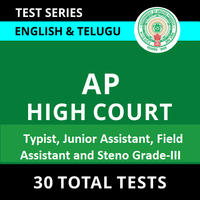English MCQs Questions And Answers: English is one of the most important scoring subjects for all TS And AP State level exams like APPSC Group 1,2,3, and 4, AP High Court and AP District Court, AP Police Constable & SI etc. In this article we are providing English MCQs Questions and answers, these MCQs questions and answers will definitely helps in your success.
English MCQs Questions And Answers: ఆంధ్రప్రదేశ్ మరియు తెలంగాణ లో అత్యంత ముఖ్యమైన మరియు ప్రతిష్టాత్మకమైన పరీక్షలు పోలీస్ మరియు గ్రూప్-1,2,3 అలాగే UPSC లలోనికి చాలా మంది ఆశావహులు ఈ ప్రతిష్టాత్మక ఉద్యోగాల్లో కి ప్రవేశించడానికి ఆసక్తి చూపుతారు.దీనికి పోటీ ఎక్కువగా ఉండడం కారణంగా, అధిక వెయిటేజీ సంబంధిత సబ్జెక్టులను ఎంచుకుని స్మార్ట్ అధ్యయనంతో ఉద్యోగం పొందవచ్చు. ఈ పరీక్షలలో ముఖ్యమైన అంశాలు అయిన పౌర శాస్త్రం , చరిత్ర , భూగోళశాస్త్రం, ఆర్ధిక శాస్త్రం, సైన్సు మరియు విజ్ఞానం, సమకాలీన అంశాలు చాల ముఖ్యమైన పాత్ర పోషిస్తాయి. కాబట్టి Adda247, ఈ అంశాలకి సంబంధించిన కొన్ని ముఖ్యమైన ప్రశ్నలను మీకు అందిస్తుంది. ఈ పరీక్షలపై ఆసక్తి ఉన్న అభ్యర్థులు దిగువ ఉన్న ప్రశ్నలను పరిశీలించండి.
 APPSC/TSPSC Sure shot Selection Group
APPSC/TSPSC Sure shot Selection Group
English MCQs Questions And Answers
English-Questions
Directions (1-10): Select the option that will improve the segment in bold of the given sentence. In case no improvement is needed, select ‘No improvement.’
Q1. He barely knows you, doesn’t he?
(a) Does he?
(b) Didn’t he?
(c) Will he?
(d) No improvement
Q2. Many a candidate have been hired by the company.
(a) were being hired
(b) have hired
(c) has been hired
(d) No improvement
Q3. Avinash didn’t know whether his friend was laughing or crying.
(a) Nor
(b) No improvement
(c) If
(d) But
Q4. Each of the horses have won many races.
(a) No improvement
(b) Were winning
(c) must win
(d) has won
Q5. If you eat a lot, you had put on weight.
(a) you must put on weight
(b) you put on weight
(c) you would put on weight
(d) No improvement
Q6. Jaya along with Vidya are going to a party.
(a) Were going for
(b) No improvement
(c) Have been going to
(d) is going to
Q7. An elephant raid can easily destroy a farmers months of hard work in just a few hours.
(a) The farmer
(b) a farmer’s
(c) No improvement
(d) a farmers’
Q8. A massive fire has broken against at Sariska Tiger Reserve in Rajasthan’s Alwar district.
(a) Broken in
(b) Broke off
(c) No improvement
(d) Broken out
Q9. She will go to London on tomorrow.
(a) Tomorrow
(b) At tomorrow
(c) In tomorrow
(d) No improvement
Q10. I suddenly came across her.
(a) Suddenly came across
(b) came across
(c) came across with
(d) No improvement
Solutions
S1. Ans. (a)
Sol. The correct answer is option a.
Replace ‘Doesn’t he’ with ‘Does he?’ to make the sentence grammatically and contextually correct.
The given sentence is based on a question tag. Question tags are short questions used at the end of the statements to confirm if the statement is true or not. If the main sentence is positive, the question tag should be negative and vice -versa. The auxiliary verb or verb to be in the statement matches the verb used in the tag.
The adverbs ‘Never, Rarely, Seldom, Hardly, Barely and Scarcely’ have a negative connotation. Even though they may be in a positive statement, the feeling of the statement is negative. We treat statements with these words like negative statements, so the question tag is normally positive.
S2. Ans. (c)
Sol. The correct answer is option c.
Replace ‘Have been hired’ with ‘Has been hired’ to make the sentence grammatically and contextually correct.
Many a/an – This construction is used with a singular noun to refer to a large number of things or people.
For example – Many a man has tried but few men have succeeded.
In this construction, ‘Many a’ is followed by the singular noun and a singular verb.
S3. Ans. (b)
Sol. The correct answer is option b.
The given sentence is grammatically and contextually correct.
Whether … or – It is used to introduce a clause giving two options or alternatives.
For example – I can’t decide whether to paint the wall green or blue. (Or to paint the wall blue).
S4. Ans. (d)
Sol. The correct answer is option d.
Replace ‘Have won’ with ‘Has won’ to make the sentence grammatically and contextually correct.
When we use ‘Each of’ with a plural noun as subject, it’s normally followed by a singular verb.
For example – Each of the buildings is surrounded by high metal fencing.
The given sentence states an action which indicates the present perfect tense.
The present perfect tense refers to an action or state that either occurred at an indefinite time in the past (e.g., we have talked before) or began in the past and continued to the present time (e.g., he has grown impatient over the last hour).
Structure – Have/has + the past participle.
Thus, option (d) the correct choice.
S5. Ans. (b)
Sol. The correct answer is option b.
Replace ‘You had put on weight’ with ‘You put on weight’ to make the sentence grammatically and contextually correct.
The given sentence is based on ‘The zero conditional’.
We use ‘The zero conditional’ to talk about permanent truths, such as scientific facts, and general habits.
The structure is – Simple present……. Simple present.
For example – If you heat water to 100°, it boils.
S6. Ans. (d)
Sol. The correct answer is option d.
Replace ‘Are going for’ with ‘Is going for’ to make the sentence grammatically and contextually correct.
If connectives/appositives like along with, together with, as well as, accompanied by etc. are used to combine two subjects, the verb agrees with the subject mentioned first.
For example – Mr. Ashok, accompanied by his wife and brother, was banished to the forest.
S7. Ans. (b)
Sol. The correct answer is option b.
Replace ‘A farmers’ with ‘A farmer’s’ to make the sentence grammatically and contextually correct.
Use the apostrophe to show possession. To show possession with a singular noun, add an apostrophe plus the letter s.
For Example – a woman’s hat.
The given sentence talks about the hard work of a farmer. To show that usage of ‘An apostrophe plus the letter s’ is appropriate.
S8. Ans. (d)
Sol. The correct answer is option d.
Replace ‘‘Broken against’ with ‘Broken out’ to make the sentence grammatically and contextually correct.
Break out – It is a phrase which means, ‘To start suddenly’. (Used for fighting, wars, fires, etc.)
Break in – It is a phrase which means, ‘To enter a building by force, especially in order to steal things.’
For example – Someone had broken in through the bedroom window.
Break off – It is a phrase which means, ‘To suddenly stop doing or saying something’.
For example – He started speaking and then broke off in the middle of a sentence.
Break against (something) – It is a phrase which means, ‘To crash into something and fall apart or shatter.’
For example – I dropped the vase, and it broke against the floor.
S9. Ans. (a)
Sol. The correct answer is option a.
Replace ‘On tomorrow’ with ‘Tomorrow’ to make the sentence grammatically and contextually correct.
We do not use the prepositions ‘On, At, In’ before ‘Today, Tomorrow, Yesterday, The following day, The next day.’
S10. Ans. (b)
Sol. The correct answer is option b.
Replace ‘Suddenly came across’ with ‘Came across’ to make the sentence grammatically and contextually correct.
We don’t use ‘Suddenly OR ‘With’ if in the sentence, ‘Come across’ is used.
Come across somebody/something – It is a phrasal verb which means, ‘To meet or find somebody/something by chance’.
For example – I came across children sleeping under bridges.
మరింత చదవండి:
| తాజా ఉద్యోగ ప్రకటనలు | ఇక్కడ క్లిక్ చేయండి |
| ఉచిత స్టడీ మెటీరియల్ (APPSC, TSPSC) | ఇక్కడ క్లిక్ చేయండి |
| ఉచిత మాక్ టెస్టులు | ఇక్కడ క్లిక్ చేయండి |




